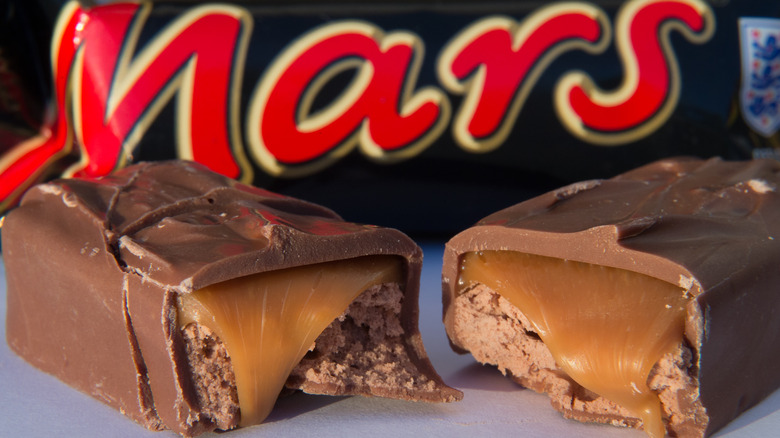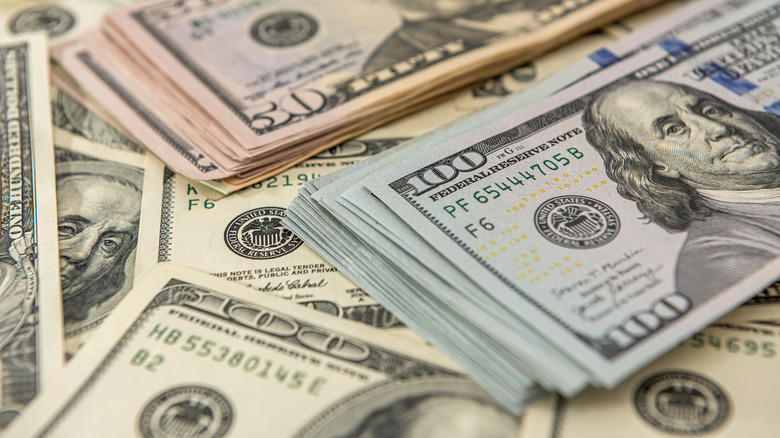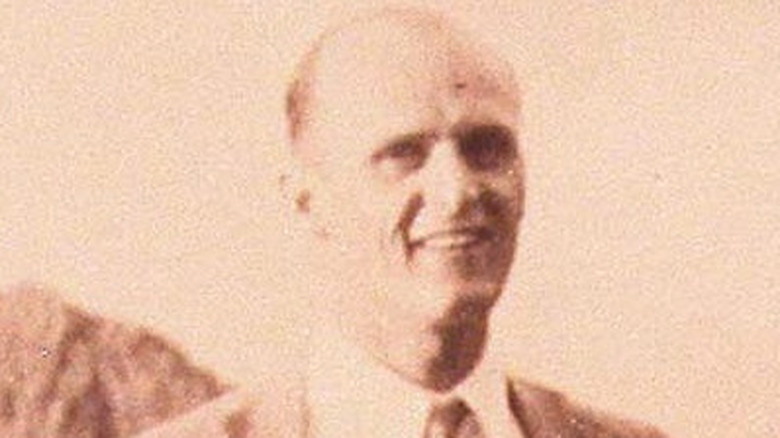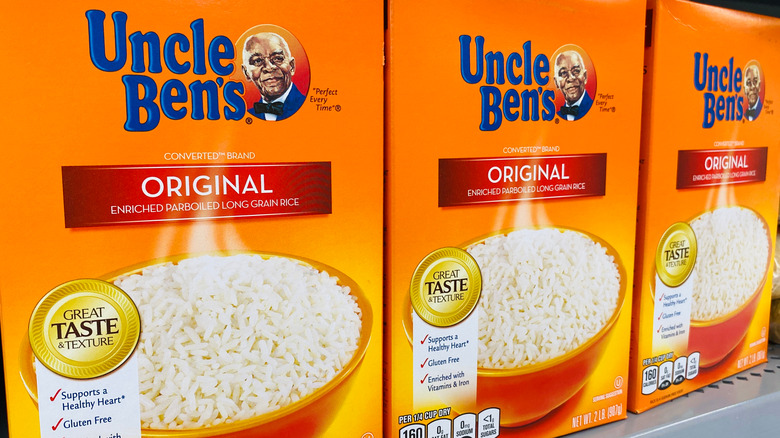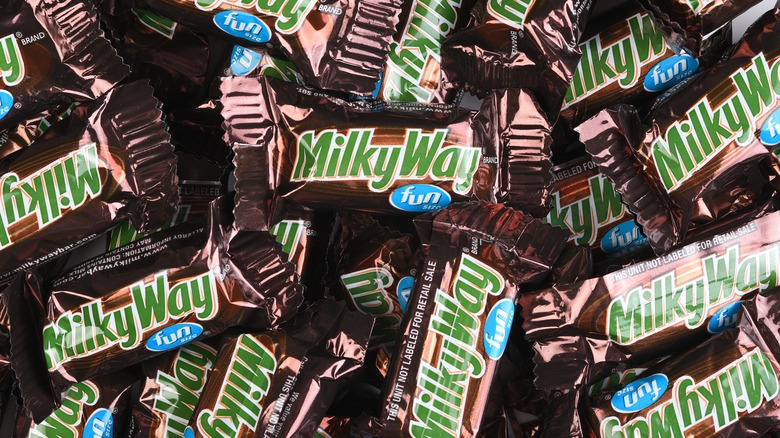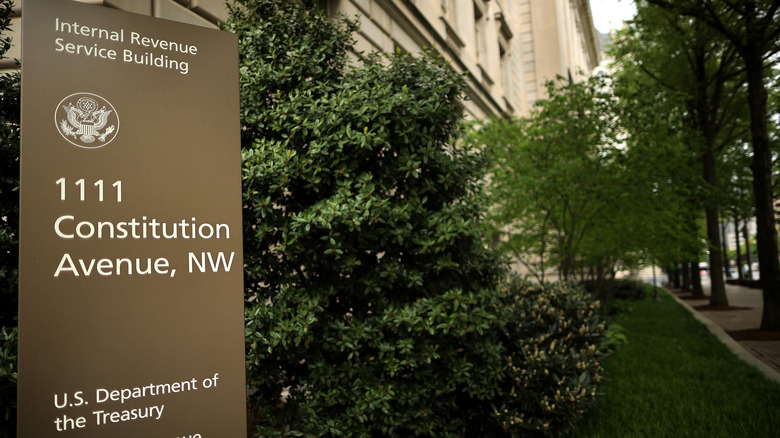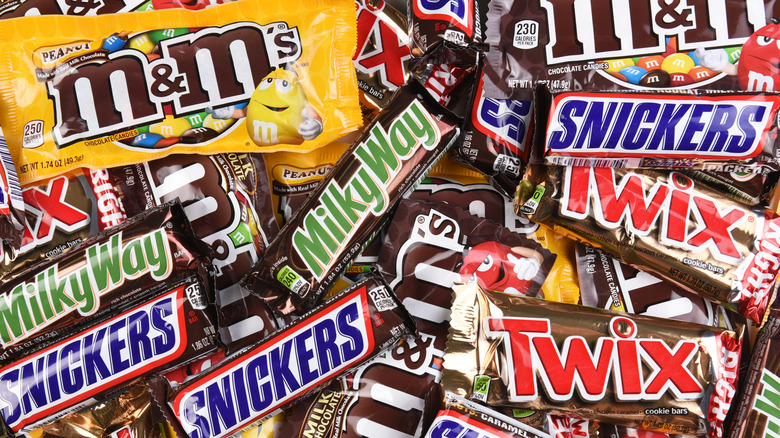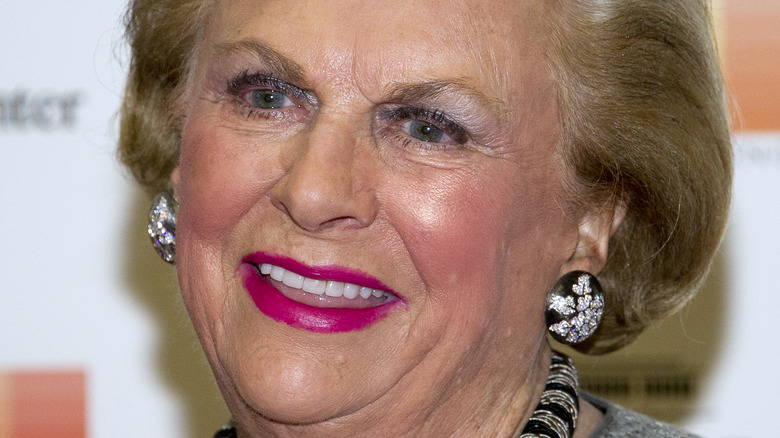The Mysterious Family Behind The Mars Wrigley Confectionery Isn't So Sweet
Candy is a part of the fabric of America — you might not think so, but when considering how deeply sweets are woven into the history and culture of this country, it's hard to deny that we are a nation in part built on (and fueled by) candy. There's Chicago's beloved Wrigley Field. There's the town of Hershey, Pennsylvania. There are candies for every major holiday. And there are the immense fortunes the candy business has brought to a number of American families. The Mars family is far and away the most successful candy clan of all.
As sweet as the Milky Ways, Skittles, M&M's, and other candies in the Mars portfolio may be, the story of the Mars family itself is one most Americans will find bittersweet at best, if not outright off-putting. Theirs is a tale more than a century in the making, and one with making money at its center. From humble origins — Franklin Clarence Mars, progenitor of the dynastic Mars clan, first started selling hand-dipped candy bars in Tacoma, Washington, in 1911, per Business Insider — the Mars family has risen to become one of the wealthiest and most influential families in the United States. And they have done so behind a veil of secrecy so opaque that the family's guarded silence has become a central part of their story. Let's unwrap the Mars family, the people behind the Mars Wrigley Confectionary, Mars Food U.K. Limited, a pet food and medicine empire, and many other ventures.
They are the third richest family in America
There's something of a paradox in American culture: We all (alright, almost all) aspire to be rich, yet we tend to disparage the super-wealthy. How much money, then, is the right amount of money to feel wealthy and successful without seeming greedy and acquisitive? At what point must a wealthy family or individual begin divesting cash and assets lest they seem miserly? The question is rhetorical, of course — there's no specific threshold of wealth above which a family can no longer be seen as a success story and must instead be judged for tight purse strings, but we venture to say that being the third wealthiest family in America puts the Mars family in a position worth scrutiny. And indeed, per Forbes, the Mars family is the third richest in America.
As of the most recent data available, the Mars family trails the Koch family, America's second richest, by only a few billion dollars — the billions can be counted on the fingers of both hands. Both the Mars and Koch families trail the Walton family in terms of wealth by a staggering amount, though. In fact, if the wealth of the Mars and Kochs were combined, which would equal some $200 billion, the Waltons would still have tens of billions of dollars more. It turns out that being the largest company in America pays very well — even better than being the largest candy maker.
The patriarch of the family was notoriously private and guarded
Franklin Clarence Mars was the first member of the Mars family to begin making and selling candy on a commercial scale, but it is to his son, Forrest Mars Sr., that the term "patriarch" is more properly applied. Forrest was the one who truly defined and grew the family business, starting the clan's journey toward immense wealth, reach, and influence. And it was Forrest Mars Sr. whose attitude and approach toward the outside world would set the tenor for business and family operations in regard to anyone outside the secretive Mars orbit. Forrest avoided interviews, dodged press questions, and was rarely even photographed, at least for newspapers or magazines (via The New York Times). Per Business Insider, it was not until the late 2010s, well after the death of Forrest Mars Sr., who passed away in 1999 at the age of 95 leaving the Mars business to his three children, that the company's policy of sealed lips began to change.
Under CEO Stephen Badger — who has now stepped down from that position but remains on the board at Mars — the company finally began to grow more transparent, offering public opinions on the health of the planet, corporate and social responsibility, and many other issues. It's unclear if the Mars organization felt compelled to open up in the social media era or if the added transparency was of its own volition, but the results are the same.
Forrest Mars Sr. protected a patent against the wishes of the US Army
Among the many products in the proverbial stable at Mars, from Wrigley's gum to candy bars aplenty to snacks like Combos to major global pet food brands like Pedigree and Whiskas, Mars has long sold untold millions of dollars worth of rice, specifically rice sold under the quick-cooking parboiled brand formerly known as Uncle Ben's and today called Ben's Original, per CNN. During WWII, the Mars company did much to help support troops fighting overseas, shipping the entire supply of its quick-cooking and insect-resistant rice to soldiers. The rice was produced using a special parboiling technique patented by the company in 1942, per Confectionary News.
The rice was such a safe, efficient, and reliable way to feed deployed troops that, per the Washingtonian, the military asked Forrest Mars Sr. to share the patents for the company's rice production process with other companies in order to maximize output, but he resisted their request. And Forrest kept on pushing back against the military until the end of World War II saw the government cease its attempt to compel the sharing of the information. The Mars family would add untold amounts of money to their fortune selling Uncle Ben's rice products (which had been called Converted Brand Rice during the war) in the coming decades, the secrets of production still closely held.
The famous Milky Way bar was a cheaper option than pure chocolate
When it was first released in the year 1923, the Milky Way bar was an absolute sensation, according to North Loop. The candy bar was not named for the galaxy in which we denizens of planet Earth find ourselves spinning about, but rather for a popular malted milk drink of the time, per Milky Way. The bar was an attempt to capture the flavor of a malted milkshake in a chocolate coating. It did this thanks to the Mars company's nougat filling made from egg whites, malt flavor, and sugar syrup, all whipped to an airy foam. And while nougat is a tasty filling that earned its success a hundred years back and its global popularity today, the taste of the new foodstuff was not why it was of such great interest to Frederick Mars — it was more a matter of price.
Nougat was much cheaper to produce than solid chocolate, so the fact that Milky Way bars tasted good, cost less than solid chocolate bars, and could be sold as an exciting new product without the price marked down to reflect their lower production cost were all wins for the Mars Family. Within the first year that they were on the market, Milky Way bars accounted for some $800,000 in sales, which is nearly $14 million in today's money, per Inflation Calculator. The Mars ascent had begun in earnest.
The family has lobbied extensively against the estate tax
According to the IRS, the estate tax is a tax on assets passed down to your descendants after your death. And the Mars family would like very much for this tax not to exist anymore.
The Mars family has spent millions of dollars on efforts to abolish the estate tax, according to Public Citizen, a nonprofit consumer advocacy group. They're not alone in their efforts: the families behind Walmart, Campbell's soup, and Wegmans grocery stores, among many others, have all lobbied against the estate tax. Public Citizen estimates that the 18 wealthiest families in America stand to keep more than $71 billion in their hands if the Estate Tax is repealed, which explains why they have, collectively, spent decades fighting against it. This effort has manifested in a variety of ways, from setting up nonprofit political organizations to funding trade associations to lobbying politicians directly.
Mars businesses have been accused of unethical practices
From charges of animal cruelty to sourcing cocoa from illegally deforested land to using ingredients harvested by child laborers, Mars has faced more than its share of unsavory allegations. In 2009, per The Washington Post, Mars announced a ten-year goal to begin sourcing all of its cocoa from growers and suppliers that met a certain set of standards in terms of environmental impact and labor protections. The announcement of this goal may have seemed admirable from one point of view, but from another, it was a tacit admission that it was producing candy (and profits) using ingredients harvested at the expense of people and the planet. As of 2019, Mars had yet to reach its goal to produce zero-deforestation chocolate, and the company pushed its deadline back by five years.
Just two years before that labor and environmental goal was announced, Reuters reported that PETA was boycotting Mars over its alleged unethical treatment of animals. The animal welfare group said in a statement: "In violation of its own written policy, the candy company is currently funding a study at the University of California, San Francisco, that uses rats. The rats are force fed by having plastic tubes shoved down their throats, and they are then cut open and killed." In addition to the boycott, PETA also filed a formal complaint with the FTC alleging Mars was engaging in dishonest advertising.
The company was vindictive when an executive left
The Mars family is a group that puts a premium value on loyalty. In late 2018, following a career with Mars that spanned just under a quarter of a century, the former CFO of a division of the company's pet care business, Jacek Szarzynski, reported that Frank Mars, a family member and member of the board, literally stamped on his foot following a presentation the executive had given, per CNBC. Why such anger with Szarzynski? In his own words: "They were upset that, after 24 years working for Mars, I had the temerity to leave." He was departing Mars for a position at JAB Holdings, a company that was in some ways a competitor to Mars.
And the allegedly vindictive behavior hardly stopped with one minor foot-stomping assault. There was intimidation and even a lawsuit brought by Mars against their longtime former employee. Mars accused Szarzynski of stealing trade secrets because he had downloaded thousands of pages of material to a computer before leaving the company, and despite the fact that he offered to return all materials, which were of both a professional and personal nature, Mars persisted with the suit, per the Financial Times.
The Mars family enjoyed huge profits during the pandemic
At a time when Americans — not to mention people all over the world — were suffering immensely, Mars was doing better than ever. In fact, Mars has even overtaken the juggernaut Coca-Cola Company in terms of sales, per Yahoo!. The company's sales skyrocketed to just under $45 billion in the year 2021, a year during which Coke's total sales were a little bit below $39 billion. Though some of the company's recent profitability can be linked to pre-pandemic acquisitions of animal care businesses, much of its recent profits simply comes down to lots of sales.
One way Mars saw its profits grow early on during the pandemic, per the Union of Concerned Scientists, was by keeping its production operations running at full tilt while implementing precious few protections for the workers in its factories. A senior analyst with the nonprofit Union said of some Mars facilities: "[They] lacked basic safety measures such as socially-distanced workstations, adequate warehouse sanitation, or COVID-19 screening, and worse, workers were systematically denied paid sick leave." It turns out the story behind all of those candy profits isn't so sweet.
The family owned a massive estate and horse farm
There is nothing intrinsically wrong with owning a horse farm and/or a massive country estate, though those are the trappings of having a massive amount of money. In the case of the Mars family, its former Tennessee property, called the Milky Way Farm, was over-the-top even for a rich equestrian estate. Per the "About the Farm" page from the Milky Way Farm's own website, the property was first developed by Frank Mars in the early 1930s and featured a 25,000-square-foot Manor House with 20 bedrooms. The property was well over 1,000 acres and featured an astonishing 30 barns and 70 cottages. There were cattle, sheep, and, of course, lots of horses.
As this sprawling estate with its palatial main house was being built, the rest of the country — and indeed most of the world — was dealing with a moment in history that came to be called the Great Depression. The luxuriousness of the farm starkly contrasted the immense wealth of the Mars family against the poverty and hardship many Americans were dealing with during the Depression. You can visit the estate to this day and can even book it out for weddings or other uses (And for the record, it has not been Mars owned for many years).
The heiress of the candy empire was involved in a tragic car crash
In the fall of the year 2013, Jacqueline Badger Mars — one of the three heirs to the Mars business and its fortune, it having all been divided between her and her two siblings — drove her 2004 Porsche SUV head-on into a minivan carrying a family driving in the opposite direction, per the Daily Mail. It remains unclear what caused Mars, 74 at the time, to cross the median and into the path of oncoming vehicles on that early afternoon in October, but the results were deadly. An 86-year-old grandmother who was riding in the van was killed in the crash and pronounced dead at the scene. The woman driving the car was eight months pregnant at the time and lost her baby in the wreck, per Forbes. The four other passengers were injured as well. Jacqueline Badger Mars herself was treated for minor injuries and released from the hospital on the same day as the accident took place.
Mars was not found to be under the influence of any drugs or of alcohol and she was charged only with the misdemeanor of reckless driving. She did express deep remorse and sadness for the tragedy. While the crash was ruled as an accident, it's undeniable that Mars' mistake behind the wheel led to a loss of life.
The family has not ceased operations in Russia
Since Russia illegally invaded sovereign Ukrainian territory in late February of 2022 (building on illegal occupations and annexations from 2014), many companies big and small have ceased doing business within the bounds of the Russian Federation. For example, none other than McDonald's pulled out of Russia entirely, a decision that cost the company over $1 billion, per CNBC. The Yale School of Management tracks the numbers and has counted more than a thousand businesses that have done the same. On the other hand, some businesses have taken the less admirable but at least understandable approach of simply suspending business operations in Russia, though many seem poised to resume working there once President Putin's invasion ends.
Other companies have continued to do business in Russia, and Mars is among that group. Per Yale, while Mars has, as of the time of this writing, scaled back on its operations, having ceased advertising and making new investments in Russia, the company is still very much selling its products there.
